#CA Final Books
Explore tagged Tumblr posts
Text
How to Tackle the Most Challenging CA Final Subjects
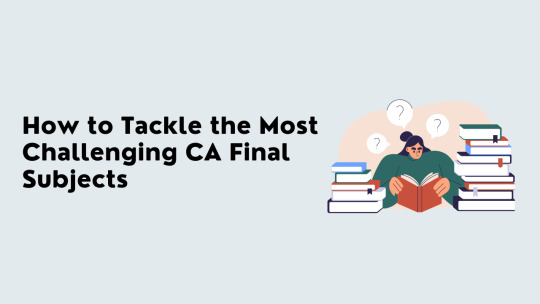
The CA Final exams are the last hurdle in the journey to becoming a Chartered Accountant. These exams test a candidate's knowledge, analytical skills, and practical application of various accounting principles. However, some subjects pose more challenges than others. This blog will guide you on how to tackle the most challenging CA Final subjects effectively.
1. Financial Reporting (FR)
Financial Reporting is often considered one of the most challenging subjects due to its vast syllabus and the complexity of accounting standards. Here's how to tackle it:
Conceptual Clarity: Ensure that you have a strong grasp of accounting standards and concepts. Refer to Scanner CA Final Books for a comprehensive understanding.
Practice Problems: Regular practice is crucial. Solve questions from past exam papers and CA Final Scanner to familiarize yourself with the types of questions asked.
Revision Notes: Create concise notes for each standard. These notes will be handy during the revision period.
2. Strategic Financial Management (SFM)
Strategic Financial Management involves complex calculations and strategic decision-making. To master this subject:
Understand Concepts: Before jumping into problem-solving, ensure you understand the underlying financial concepts.
Formula Memorization: Create a formula sheet and revise it regularly.
Use Scanners: Utilize CA Final Books to practice a variety of problems. This will help you identify patterns and frequently asked questions.
3. Advanced Auditing and Professional Ethics (Auditing)
Auditing is another tough subject due to its theoretical nature and the need for critical thinking. To excel in Auditing:
Reading and Writing: Regularly read the study material and practice writing answers to improve retention.
Case Studies: Focus on case studies and practical questions. The CA Intermediate Scanner can be particularly helpful for this.
Ethics and Standards: Pay special attention to professional ethics and auditing standards, as these are crucial for scoring well.
4. Corporate and Economic Laws
Corporate and Economic Laws is a subject that requires detailed reading and understanding of various laws and regulations. Here’s how to handle it:
Regular Reading: Make it a habit to read the law regularly. Summarize key points in your own words.
Refer to Scanners: Use CA Entrance Exam Books to practice questions and understand the pattern of questions asked in exams.
Flowcharts and Diagrams: Create flowcharts and diagrams to remember complex legal provisions and their applications.
5. Direct Tax Laws and International Taxation
Direct Tax Laws is a vast and dynamic subject with frequent updates. To manage this subject:
Stay Updated: Regularly update yourself with the latest amendments and notifications.
Conceptual Understanding: Focus on understanding the concepts rather than rote learning.
Practice with Scanners: Use books for CA Exam to practice a wide range of questions and enhance your problem-solving skills.
6. Indirect Tax Laws
Indirect Tax Laws, including GST, can be quite challenging due to its practical application and frequent changes. To tackle this subject:
Detailed Study: Study each section of GST in detail to cover the foundational aspects.
Practical Problems: Solve practical problems from CA Foundation Scanner to build a strong base.
Regular Revision: Regularly revise the key provisions and practice writing answers to practical questions.
Conclusion
Tackling the most challenging CA Final subjects requires a strategic approach combining thorough understanding, effective time management, and consistent practice. Focus on conceptual clarity and utilize a mix of study materials, including ICAI modules, reference books, and practice manuals. Regularly solve past exam papers and take mock tests to gauge your preparation. Seek guidance from mentors and join study groups for collaborative learning. Stay organized with a well-structured study plan, prioritize difficult topics, and allocate sufficient time for revision. Maintaining a balanced routine with breaks and stress management techniques is crucial for optimal performance.
#Scanner CA Final Books#CA foundation scanner#CA intermediate scanner#CA final scanner#CA Final Books#Books for CA Exam#CA Entrance Exam books
0 notes
Text
Online vs. Offline Study: Which is Better for CA Exam Prep?
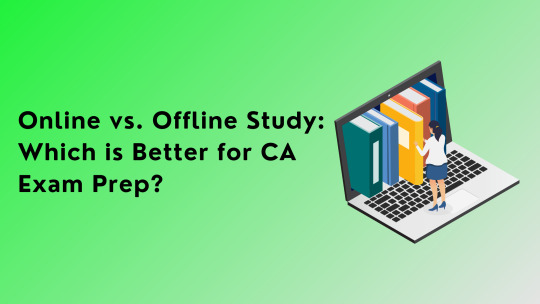
For those who want to become accountants, preparing for the Chartered Accountancy (CA) exam is an important step. With so many options at their disposal these days, students frequently struggle to decide between using online and offline study techniques. Each has advantages, and the decision is mostly based on learning preferences and styles. Here, we examine the benefits and drawbacks of each strategy to assist you in selecting the best one for preparing for the CA exam.
The Case for Online Study
1. Accessibility and Convenience:
One of the biggest advantages of online study is accessibility. Students can access study material for CA from anywhere, at any time. This flexibility is particularly beneficial for those balancing work, internships, or other commitments.
2. Updated Content:
Online platforms frequently update their content, ensuring that students have access to the latest CA entrance exam books and study materials. This is crucial for an exam like CA, where the syllabus and regulations can change.
3. Interactive Learning:
Interactive learning tools including discussion boards, tests, and video lectures are available in a lot of online study resources. These can enhance understanding and retention of complex concepts found in CA Foundation books and CA final books.
4. Cost-Effective:
The cost of online resources is frequently lower than that of offline ones. Students can find a plethora of free or reasonably priced books for CA exams and supplementary study materials online.
The Case for Offline Study
1. Structured Learning:
Studying offline offers a more structured setting. Examples of offline study strategies include using physical CA test materials or coaching classes. This can support students in keeping up a regular study routine, which is necessary for in-depth planning.
2. Personal Interaction:
In offline situations, face-to-face interactions with peers and teachers can be quite beneficial. These exchanges provide more individualized instruction, prompt feedback, and doubt clarification.
3. Reduced Distractions:
Distractions that are frequently present when studying online can be reduced by studying offline. Students can concentrate better on their CA entrance exam books and other study materials if they are not distracted by the internet's incessant updates and temptations.
4. Tangible Resources:
For many kids, it's simpler to navigate through real books than digital ones. Studying can be improved by having the capacity to swiftly turn pages, comment, and highlight text.
Combining Both Methods
A combination of methods that blend online and offline study techniques can prove to be the most efficacious for numerous students. Here's how to take advantage of both:
1. Use Online Resources for Supplementary Learning:
Use internet resources to enhance your traditional CA exam materials with additional study. Participate in online forums to discuss issues with peers or watch video lectures to gain understanding of complex subjects.
2. Regularly Update Your Knowledge:
Keep yourself informed about the most recent modifications to the CA syllabus by often visiting internet resources. This guarantees the accuracy of the data in your CA books.
3. Attend Offline Coaching Classes:
To take advantage of supervised instruction and one-on-one time with a coach, sign up for in-person coaching sessions. To reinforce the material you study in these classes, use online resources.
4. Practice with Online Mock Tests:
Utilize online practice exams to gauge your degree of readiness. These exams assist you in identifying areas that require development by simulating the real exam setting.
Conclusion
The question of whether to prepare for the CA exam offline or online ultimately comes down to personal preference. While offline study gives more structure, one-on-one connection, and less interruptions, online study offers flexibility, cost-effectiveness, and access to current content. One can create a thorough and successful preparation strategy by taking a balanced approach that incorporates the best features of both approaches.
#ca final books#study material for ca#books for ca exam#ca foundation books#ca intermediate books#ca entrance exam books
0 notes
Text
Complete Guide to CA After 12th
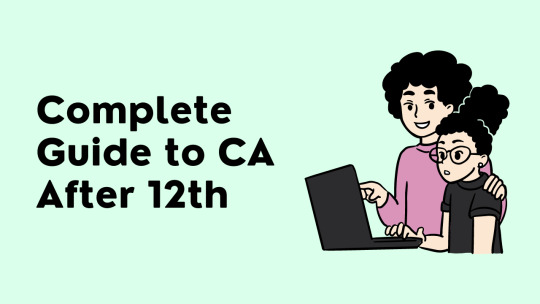
It can be exciting and difficult to start your road toward becoming a Chartered Accountant (CA) as soon as you finish your 12th grade. You will find all the information you need about the CA course in this all-inclusive guide, which includes eligibility requirements, for your CA Exam preparation.
Eligibility Criteria
To pursue a CA course after 12th, you need to meet the following eligibility criteria:
Educational Qualification: You must have completed your 12th grade from a recognized board.
Minimum Marks: There is no minimum percentage required in the 12th grade to register for the CA Foundation Course.
Course Structure
The CA course is structured in three levels:
CA Foundation: This is the entry-level exam.
CA Intermediate: This level requires deeper knowledge and understanding.
CA Final: This is the last stage before you become a certified Chartered Accountant.
CA Foundation
The CA Foundation Course is the first step in the CA journey. It covers four subjects:
Principles and Practice of Accounting
Business Laws and Business Correspondence and Reporting
Business Mathematics, Logical Reasoning, and Statistics
Business Economics and Business and Commercial Knowledge
To excel in these subjects, it's crucial to refer to the right CA Foundation Books.These books provide a solid foundation and help in understanding the basic concepts.
CA Intermediate
After passing the CA Foundation, the next step is the CA Intermediate Course, which comprises two groups with four papers each:
Group I:
Accounting
Corporate and Other Laws
Cost and Management Accounting
Taxation
Group II:
Advanced Accounting
Auditing and Assurance
Enterprise Information Systems & Strategic Management
Financial Management & Economics for Finance
Using the best CA Intermediate Books is essential to grasp the complex topics covered in this level. These books not only provide in-depth knowledge but also include practical problems to enhance your understanding.
CA Final
The CA Final Course is the ultimate stage. It consists of two groups, each containing four papers:
Group I:
Financial Reporting
Strategic Financial Management
Advanced Auditing and Professional Ethics
Corporate and Economic Laws
Group II:
Strategic Cost Management and Performance Evaluation
Elective Paper (Choose one from Risk Management, Financial Services & Capital Markets, International Taxation, Economic Laws, Global Financial Reporting Standards, Multidisciplinary Case Study)
Direct Tax Laws and International Taxation
Indirect Tax Laws
To succeed in the CA Final, it’s critical to use comprehensive CA Final Books and Study Material For CA. These resources provide detailed explanations, practical problems, and case studies.
Essential Study Materials
Study Material For CA
ICAI provides official study materials for all levels. These materials are meticulously designed to cover the entire syllabus comprehensively. They are essential for understanding the core concepts and for exam preparation.
Scanner CA Books
Scanner CA Books are invaluable for exam preparation. They compile previous years’ question papers along with suggested answers. Scanners help you understand the exam pattern, important topics, and the type of questions frequently asked.
Conclusion
Becoming a Chartered Accountant after the 12th grade is a structured yet challenging journey. With the right approach, dedication, and the best study materials like CA Entrance Exam Books, you can navigate through each level successfully. Remember, consistency and hard work are the keys to achieving your goal of becoming a CA. Good luck!
#books for ca exam#scanner for ca intermediate books#ca entrance exam#ca entrance exam books#ca foundation books#ca intermediate books#study material for ca#ca final books
0 notes
Text
Elevate your Performance for CA Foundation Exam
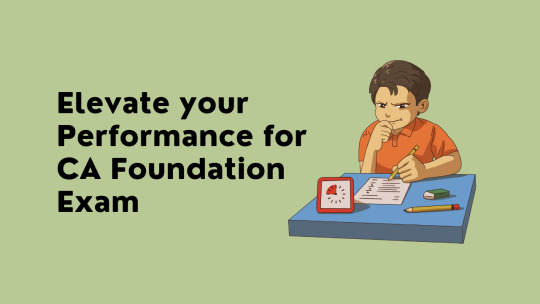
Introduction:
The CA Foundation exam serves as the gateway for aspiring chartered accountants to embark on their professional journey. With its comprehensive syllabus and rigorous testing, adequate preparation, coupled with the right CA Foundation books, is key to success. In this blog, we'll delve into top strategies to elevate your performance and excel in the CA Foundation exam.
Understand the Syllabus
Familiarise yourself with the CA Foundation syllabus, covering topics such as Accounting, Business Laws, Economics, and Mathematics. Understand the weightage of each subject and allocate study time accordingly.
Create a Study Plan
Develop a structured study plan that outlines daily, weekly, and monthly goals. Allocate time for each subject based on its importance and your proficiency level. Break down the syllabus into manageable chunks to avoid overwhelm.
Use Quality Study Material
Invest in high-quality CA Foundation books, reference books, and online resources. Choose materials that are recommended by experienced professionals or coaching institutes. Utilise past exam papers and mock tests to gauge your preparedness.
Practice Regularly
Practice is key to mastering any subject. Dedicate ample time to solving problems, answering questions, and practising numerical problems. Regular practice enhances understanding and retention of concepts.
Focus on Conceptual Understanding
Instead of rote memorization, focus on understanding the underlying concepts. This approach not only helps in answering theoretical questions but also enables you to apply concepts to real-world scenarios.
Seek Clarifications
Don't hesitate to seek clarifications from teachers, mentors, or peers if you encounter any doubts or difficulties while preparing for the CA entrance exam. Clearing doubts promptly ensures a strong foundation and prevents misconceptions from affecting your performance. Utilise recommended CA entrance exam books to supplement your studies and deepen your understanding.
Time Management
Develop effective time management skills to ensure you cover the entire syllabus within the stipulated time. Allocate time for revision, practice, and mock tests. Prioritise questions based on marks and difficulty level during the exam.
Stay Updated
Stay updated with the latest amendments, notifications, and changes in the CA Foundation syllabus. Incorporate these updates into your study material and practice regularly to stay abreast of any changes and ensure you're prepared perfectly for the exams.
Maintain a Healthy Lifestyle
Take care of your physical and mental well-being during the exam preparation period. Get adequate sleep, eat healthily, and incorporate regular exercise or relaxation techniques to manage stress effectively. A healthy body and mind are essential for optimal performance.
Stay Motivated
Keep yourself motivated throughout the preparation journey for the CA Foundation exam. Set realistic goals, celebrate small victories, and stay focused on your long-term objectives with the perfect CA Foundation Books by your side. Visualise success, believe in your abilities, and stay determined to give your best effort.
Conclusion
Preparing for the CA Foundation exam requires dedication, perseverance, and effective strategies. By following these top strategies, you can elevate your performance, maximise your preparation, and increase your chances of success. Stay focused, stay motivated, and remember that consistent effort and determination will ultimately lead to success. Best of luck on your CA Foundation journey!
0 notes
Text

Embark on a transformative journey in the realm of strategic management with the Value Chain Analysis module in CA Final SCPM, beginning May 24th attempt onwards. This dynamic addition to the curriculum empowers candidates with a comprehensive understanding of how businesses create and deliver value. Dive into the intricacies of each stage in the value chain, from inbound logistics to outbound logistics, production, marketing, and service, unraveling the key drivers of competitive advantage. The May 24th attempt onwards introduces an enhanced perspective on strategic decision-making, aligning with the evolving demands of the professional landscape. Unlock the power of strategic insights and elevate your proficiency in value creation. Seize the opportunity to master Value Chain Analysis, positioning yourself for success in the CA Final examination and equipping yourself with the strategic prowess demanded in today's competitive business environment.
0 notes
Text
Top Five Reasons Why People Quit Pursuing a Chartered Accountant (CA) Qualification
Introduction
Becoming a Chartered Accountant (CA) is a prestigious and rewarding career path, but it's not for everyone. Many aspirants embark on this journey but, along the way, decide to change course. In this article, we'll explore the top five reasons why people often choose to quit pursuing a CA qualification.
1. Exam Difficulty and Failure (The Weight of CA Examinations):
The difficulty of CA exams is a formidable hurdle for many aspirants. These exams are notorious for their intricate and demanding content, creating immense pressure to succeed. Consequently, the weight of these examinations can become overwhelming, causing a sense of demotivation among candidates, especially when faced with repeated failures. This discouragement often culminates in individuals reconsidering their pursuit of a CA qualification. The relentless challenges posed by CA exams can test one's determination and resilience, making it a prominent reason why some opt to abandon this demanding career path.
2. Stress and Burnout (Balancing Act):
The path to CA exams necessitates a rigorous study regimen, demanding prolonged hours of intense focus. This endeavor often results in a delicate balance between work, personal life, and studies. Striving to maintain this equilibrium can lead to considerable stress, pushing individuals toward severe burnout. The pressures of managing responsibilities can take a toll on mental and physical well-being, making it progressively challenging to sustain optimal health. The toll of this balancing act can be overwhelming, prompting some aspirants to question their ability to continue, and ultimately causing them to contemplate quitting their pursuit of a CA qualification.
3. Lengthy and Demanding Program (The Marathon of CA Studies):
The journey through the CA program is more akin to a marathon than a sprint. It's a protracted process, spanning several years, encompassing numerous levels and exams. This extended duration can be disheartening for individuals who aspire to enter the workforce promptly. The commitment required to complete the program can appear daunting, particularly to those eager to kick-start their careers. The prolonged timeline becomes a significant factor that discourages some from continuing on this demanding path. For those seeking quick professional entry, the lengthy and demanding nature of the CA program may prompt them to reconsider and explore alternative career routes.
4. Financial Burden (The Cost of Excellence):
Achieving a CA qualification often comes with a significant financial burden. The expenses linked to coaching classes, study materials, and exam fees can accrue swiftly, exerting immense pressure on aspirants. For those grappling with financial constraints or struggling to secure sufficient financial support, this burden can become insurmountable. It necessitates a careful evaluation of priorities and resources. Some individuals may be compelled to reevaluate their pursuit of a CA qualification due to the daunting cost implications, diverting their attention toward more financially viable career options. The substantial financial investment required can indeed serve as a formidable deterrent on this demanding journey.
5. Alternative Career Opportunities (Diverging Paths):
Life is replete with unforeseen opportunities, and some CA aspirants may stumble upon enticing job offers or uncover alternative career avenues that resonate more with their aspirations and passions. These newfound opportunities can be compelling, often aligning better with their personal and professional goals. As a result, their focus may gradually shift away from completing the demanding CA program. The allure of alternative career paths can be a strong motivator for individuals to reconsider their commitment to the CA qualification. It highlights the ever-evolving nature of career choices and how unexpected options can divert them from their initial pursuit.
Conclusion
Becoming a Chartered Accountant is a commendable goal, but it's essential to recognize that the journey is demanding, both mentally and financially. Not everyone who starts down this path will reach the destination. The top five reasons mentioned above are common factors that lead individuals to reconsider their CA aspirations. It's crucial to assess one's commitment, resources, and personal circumstances before embarking on this challenging journey.
0 notes
Text


a lookbook for lori roux, c. 1913
everyday: hat / dress / shoes
formal: dress / gloves / shoes
athletic: hat / top (middy top) / bottoms / socks (bg) / shoes
sleepwear: corset / robe / socks / shoes
party: dress / shoes
swimwear: headwrap / bathing suit / shoes
summer: hat / dress / shoes
winter: hat / coat (florence outerwear) / fur shawl / gloves (bg) / shoes
#this has been on my wip list for MONTHS. shes finally here#i didnt realise her summer outfit is actually sleepwear </3 oh well.#in my head she tries hard and dresses nice so that its less obvious of what she does for a living. even if she is in the blue book#i imagine she earns enough to be able to buy nice clothes anyway :)#also peep the ring. i wonder who gave her that hmm#ts4 lookbook#ts4 historical#ts4 cas#c: lori#1913
58 notes
·
View notes
Text





sentate may 2023 collection — absolutely obsessed with this collection ❣️
thnx to @sentate for their beautiful work, as per usual :’)
#finally figured out how to remove that box behind the heads woooo#sims 4#sims 4 simblr#sims 4 cc#sims 4 custom content#sims#sims 4 cas#ts4 custom content#ts4 cc#sims 4 story#sims 4 look book#sims 4 lookbook#sims4 sentate#sims 4 outfit#ts4 cas#ts4 cc download
371 notes
·
View notes
Text




“I feel the beauty of seeing myself for the first time, and it overcomes me.”
#I didn’t even mean to color coordinate them but here we are#after talking about her all week I finally posted willow 😁#caption is a line from the newest book I read that makes me hhhhjfkshdkskd#pls give them all a kiss on the forehead thank u#mysims#simblr#the sims 4#sims 4 screenshots#ts4#sims 4 cas#ts4 cas
308 notes
·
View notes
Text






#Anna Dressed In Blood#Kendare Blake#finally read the books#fuck me they were tragic#i wanted so badly for Anna and Cas to have a happy ending#anyway it's made me think up stories Ill probably never write#and make a spotify playlist#fuck this series for making me cry#fanart of sorts#yeah that's me
10 notes
·
View notes
Text
How To Manage Articleship and CA Exam
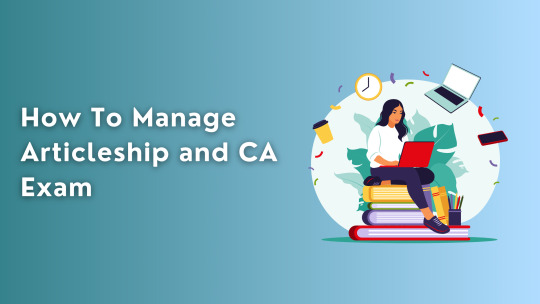
It can be difficult to balance articleship preparation with CA test preparation. However, both may be managed successfully with the correct tactics and tools. Here are some pointers for balancing articleship responsibilities with CA test preparation.
1. Create a Realistic Study Schedule
Making a realistic study schedule is one of the first stages to manage your articleship and CA test preparation. Determine when you work and set aside time just for studying. Cover the more serious elements of the syllabus throughout the weekends and vacations. In order to prevent burnout, make sure you take pauses.
2. Utilize the Best CA Books
Investing in high-quality study materials can significantly enhance your preparation. For the CA Intermediate level, CA Intermediate Books are crucial. These books are designed to cover the entire syllabus comprehensively and provide a solid foundation. Similarly, for beginners, it is essential to build the basics. As you progress, CA Final will be indispensable for advanced topics like CA Final Books , Study Material etc are those things.
3. Prioritize Your Tasks
It's critical to efficiently prioritize your chores when you're short on time. Concentrate on practical areas and gain knowledge from real-world applications during your articleship. Concentrate your study efforts on the subjects that are most important and will be tested on them. Utilize Books for CA Exam to identify key areas and prioritize accordingly.
4. Make Use of Study Material
Apart from standard textbooks, make use of additional Study Material For CA. Practice guides, review tests, and suggested responses from earlier exams are all included in this. These materials aid in practice a range of questions and offer insight into the exam format.
5. Stay Consistent
The secret to juggling articleship with CA test preparation is consistency. No matter how busy you are, set aside time every day for studying—at least a few hours. Maintaining regular study habits will help you stay on schedule and prevent last-minute scrambling.
6. Join Study Groups
Getting involved in a study group can be very helpful. Engaging in peer discussions on various themes may lead to a deeper understanding of the subjects as well as alternative viewpoints. Study groups also support maintaining responsibility and motivation.
7. Seek Guidance from Seniors and Mentors
Never be afraid to ask mentors and seniors who have completed their articleships and passed the CA examinations for advice. They can offer moral support, the greatest CA Books recommendations, and insightful advice.
8. Leverage Online Resources
There are a ton of internet tools available in today's digital age to help you prepare better. Video lectures, webinars, and online courses can offer more clarification on difficult subjects. For the CA exams, a variety of platforms provide study guides that include interactive sessions and mock exams.
9. Take Care of Your Health
While focusing on studies and articleship, do not neglect your health. A healthy mind and body are essential for effective studying. Ensure you get adequate sleep, eat nutritious food, and incorporate some form of physical activity into your daily routine.
10. Practice Time Management
Time management that works is essential. Divide up your study periods into smaller, more manageable halves, and utilize focus-boosting strategies like Pomodoro. To increase your speed and accuracy, practice answering questions in the allotted time by using the CA Exam books.
Conclusion
It takes careful time management, consistent study habits, and utilizing real-world experience to prepare for the CA tests in addition to an articleship. To thrive in both, set priorities for your career, look for guidance, and keep a healthy work-life balance. Relentlessness and consistency are essential for reaching your CA objectives.By following these strategies and making the most of the available CA Books and CA Entrance Exam Books, and , you can effectively manage your articleship while preparing for your CA exams. With dedication and smart work, achieving the coveted CA title is within your reach.
#ca final books#study material for ca#books for ca exam#ca intermediate books#ca entrance exam books#ca foundation books#studymaterialforca#study material
0 notes
Text
Navigating the New Scheme for Education and Training in CA Final Course

It's important to stay updated with resources and educational programs in the continuously changing rule of chartered accountancy (CA). The updated syllabus brought forth by the New Scheme for Education and Training aims to equip aspiring chartered accountants for the evolving demands of the business. In this blog post, we'll go over the key components of the new strategy, discuss recommended reading lists, and provide tips on how to perform well on the CA Entrance Exam.
Understanding the New Scheme for Education and Training
The New Scheme for Education and Training in CA represents a strategic shift towards a more practical and application-oriented approach. It emphasizes real-world scenarios, case studies, and hands-on learning to prepare candidates for the complexities of modern accounting and finance practices. The scheme comprises three levels: Foundation, Intermediate, and Final.
Navigating the CA Entrance Exam Successfully
The CA Entrance Exam serves as the gateway to the profession, assessing candidates' aptitude and readiness to pursue the CA course. Here are some tips for navigating the entrance exam successfully:
Understand the Exam Pattern: Familiarize yourself with the format and structure of the entrance exam, including the number of questions, duration, and marking scheme.
Create a Study Plan: Develop a structured study plan that allocates sufficient time for each subject. Prioritize areas of weakness while ensuring comprehensive coverage of all topics.
Practice Regularly: Regular practice is key to mastering the concepts tested in the entrance exam. Solve sample papers, attempt mock tests, and utilize CA Entrance Exam books to enhance your preparation.
Seek Guidance: Don't hesitate to seek guidance from experienced mentors, tutors, or fellow aspirants. Joining a coaching institute or online study group can provide valuable insights and support.
Stay Updated: Stay informed about any modifications or revisions to the ICAI's syllabus or test design. For the most recent information, subscribe to relevant publications or internet forums for discussion.
Latest Updates on ICAI New Scheme
The Institute of Chartered Accountants of India (ICAI) has released the updated syllabus for the CA Final course, applicable from May 2024. This new syllabus, under the new scheme of education and training, aims to better equip aspiring Chartered Accountants with the skills and knowledge needed in the dynamic field of accounting and finance.
Overview of the New CA Final Syllabus
The updated syllabus for the CA Final course consists of six papers, streamlined from the previous eight. This change aims to focus on core areas and eliminate redundancy. Each paper is designed to cover a comprehensive range of topics essential for the professional competence of future CAs.
Group I
Paper1:FinancialReporting
Focuses on Indian Accounting Standards (Ind AS), group financial statements, and financial instruments.
Key topics include Business Combinations, Consolidation, and Ind AS specific requirements.
Paper2:Advanced Financial Management
Covers strategic financial management, risk management, security valuation, and portfolio management.
Includes topics like derivatives, foreign exchange exposure, and mergers and acquisitions.
Paper3:Advanced Auditing and Professional Ethics
Deals with comprehensive direct tax laws including recent amendments and international taxation principles.
Topics include transfer pricing, BEPS, tax treaties, and taxation of digital transactions.
Group II
Paper4:Direct Tax Laws & International Taxation
Deals with comprehensive direct tax laws including recent amendments and international taxation principles.
Topics include transfer pricing, BEPS, tax treaties, and taxation of digital transactions.
Paper5:Indirect Tax Laws
Focuses on GST and Customs Law.
Key areas include supply, charge of GST, input tax credit, and procedures for import and export under GST.
Paper6:Integrated Business Solutions
A multi-disciplinary case study paper that includes strategic management and business solutions.
This paper requires the application of knowledge from all other subjects in practical scenarios.
Recommended Study Materials for CA Final Exam
Preparing for the CA Final examination requires access to high-quality study materials that cover the entire syllabus comprehensively. Here are some recommended resources
CA Final Books: A curated selection of textbooks authored by renowned experts in the field. These books provide in-depth coverage of each subject and serve as essential reference materials for exam preparation.
Scanner CA Final Books: Scanners are invaluable tools for CA aspirants, offering a collection of past exam questions categorized topic-wise. Practicing with scanners helps candidates familiarize themselves with the exam pattern and refine their problem-solving skills.
Study Material for CA Final Books: The Institute of Chartered Accountants of India (ICAI) provides official study materials for CA Final aspirants. These materials are meticulously crafted to align with the exam syllabus and often include case studies, illustrations, and practice questions to aid comprehension.
CA Entrance Exam Books: For candidates preparing for the CA entrance exam, a comprehensive guidebook covering mathematics, logical reasoning, and General Awareness is essential. These books help build a strong foundation in the subjects tested, ensuring thorough preparation and enhancing the chances of success in the exam.
Conclusion
The New Scheme for Education and Training in CA provides a modern way to prepare future Chartered Accountants for their professional challenges. By using the recommended study materials and effective study strategies, students can confidently and ability to navigate their CA journey. With hard work and dedication to success in the CA Entrance Exam and beyond is achievable.
#ca entrance exam#scanner for ca intermediate books#books for ca exam#ca entrance exam books#study material for ca#ca intermediate books#ca foundation books#ca final books
0 notes
Text
Winning Strategies for the last month CA Intermediate Exam
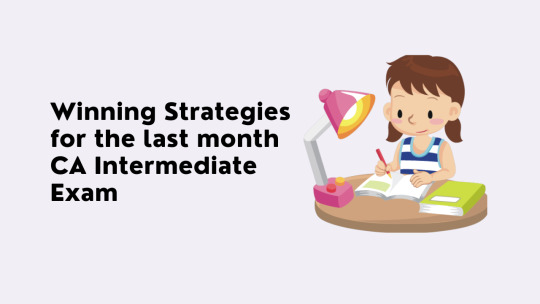
As the CA Intermediate exams draw near, it's time for aspirants to buckle down and focus on effective strategies to maximise their chances of success. The last month leading up to the exams is crucial, and how you utilise this time can significantly impact your performance.
Here are some winning strategies to help you make the most of this crucial period:
Create a Comprehensive Study Plan
Start by mapping out a detailed study plan for the remaining days. Allocate specific time slots for each subject, ensuring you cover all topics adequately. Break down your study sessions into manageable chunks, with short breaks in between to maintain focus and avoid burnout.
Prioritise Revision
In the last month, prioritise revision over learning new concepts. Focus on revisiting key topics from some of the best CA Foundation books and other study materials. Utilise revision techniques like flashcards, mind maps, and summarization to reinforce your understanding and memory retention.
Practice with Mock Tests
Regularly take mock tests to simulate exam conditions and gauge your preparedness. Analyse your performance, identify weak areas, and allocate extra time to strengthen them. Mock tests provided in Scanner CA entrance exam books not only help in assessing your knowledge but also improve time management skills and build confidence.
Seek Clarifications
Don't hesitate to seek clarifications from teachers, mentors, or peers if you encounter any doubts or difficulties during revision. Clearing doubts promptly can prevent misconceptions from affecting your performance in the exams. Utilise CA Intermediate study material, online forums or study groups to discuss concepts and exchange insights with fellow candidates.
Focus on Conceptual Understanding
Instead of rote memorization, aim for a deep understanding of concepts. Focus on the underlying principles and logic behind each topic, which will not only help in answering theoretical questions but also in tackling practical problems more effectively.
Time Management
Practice time management rigorously during your study sessions and mock tests, especially with CA entrance exam books. Allocate appropriate time to each section of the exam and ensure that you complete the paper within the stipulated time. Prioritise questions based on marks and difficulty level to maximise your score efficiently.
Stay Healthy and Energised
Take care of your physical and mental well-being during this intense period of preparation. Maintain a balanced diet, get adequate sleep, and incorporate regular exercise or relaxation techniques to keep stress at bay. A healthy body and mind are essential for optimal performance.
Stay Updated with Amendments
Stay updated with recent amendments and changes in the syllabus of CA Final books to ensure comprehensive preparation. Incorporate the latest updates into your study material to avoid confusion during the exams.
Avoid Last-Minute Cramming
While it's tempting to cram information from CA Intermediate books in the final days, avoid this practice as it can lead to information overload and confusion. Stick to your study plan, focus on revision, and trust in the preparation you have done so far. Engage in activities that relax your mind and maintain a positive attitude towards the exams.
Visualise Success
Visualise yourself succeeding in the exams and achieving your goals. Positive visualisation can boost confidence and motivation, helping you approach the exams with a calm and focused mindset. Believe in your abilities and stay determined to give your best effort.
Conclusion
The last month before CA Intermediate exams is a critical period that requires disciplined preparation and strategic planning. By following these winning strategies, you can optimise your study approach, maximise your preparation, and enhance your chances of success. Stay focused, stay motivated, and remember that hard work and perseverance always pay off in the end. Best of luck!
0 notes
Text

2024 está terminando e eu não poderia estar mais do que feliz! Claro que muitas das coisas que planejei para o ano, mas eu consegui me reencontrar com uma parte minha que eu senti muita saudade: o meu eu escritora! Reconstruí o meu contato com uma parte importante de mim e que sem, me faz ser incompleta. Depois de praticamente um ano, finalmente consegui continuar a escrever as histórias que tanto em fazem feliz. Finalmente lancei a continuação que estava já tinha uns três anos que queria, o JV3 (para os íntimos)! 2024 é um ano importante, dos meus 20 anos como escritora, mas ainda quero comemorar da forma que minhas histórias e meus personagens merecem! Então, podem se preparar que em 2025 teremos bastantes novidades, de lançamentos e da comemoração desta autora aqui. Muito obrigada por continuarem me acompanhando, junto com meus livros! Não quero ficar me alongando demais aqui. Só passei mesmo para deixar uma mensagem de final de ano, desejando um Feliz Natal e uma ótima virada de ano - da forma que gostam - e que o ano de 2025 seja o melhor para todos. Obrigada 2024 por ter me trazido tanto! Nos vemos em 2025!
4 notes
·
View notes
Text
TIPS TO CLEAR THE CA FOUNDATION EXAM
Clearing the CA Foundation Exam requires diligent preparation and a strategic approach. Here are some tips to help you succeed:
Understand the Exam Pattern:
Familiarize yourself with the CA Foundation exam pattern, which includes four papers: Principles and Practice of Accounting, Business Laws and Business Correspondence, Business Mathematics and Logical Reasoning & Statistics, and Business Economics and Business and Commercial Knowledge.
Create a Study Plan:
Plan your study schedule well in advance. Allocate sufficient time to cover all subjects and topics.
Break your study sessions into manageable chunks, and include regular breaks for better retention.
Study Material:
Use the official ICAI study materials and suggested textbooks. These resources are designed to cover the syllabus comprehensively.
Practice Regularly:
Practice solving a variety of problems and questions from each subject. This will help you become comfortable with the exam format and improve your problem-solving skills.
Take Mock Tests:
Take mock tests and practice papers regularly. This will help you assess your progress and identify areas that need improvement.
Time yourself during these mock tests to get a sense of the exam's time constraints.
Focus on Conceptual Understanding:
Instead of rote memorization, strive to understand the underlying concepts. This will make it easier to answer application-based questions.
Revision:
Allocate time for revision in your study plan. Regularly revisiting topics will reinforce your knowledge and improve retention.
Stay Healthy:
Maintain a healthy lifestyle during your preparation. Get enough sleep, eat well, and engage in physical activity to keep your mind and body in peak condition.
Stay Updated:
Keep up with any updates or amendments to the CA Foundation syllabus or exam pattern. Make sure your study materials are current.
Seek Guidance:
If you're facing challenges in understanding certain topics, don't hesitate to seek help from teachers, mentors, or peers.
Join study groups or discussion forums to clarify doubts and share study strategies.
Stay Positive and Manage Stress:
Stay positive and maintain a calm demeanor throughout your preparation.
Practice stress management techniques like meditation or deep breathing to stay focused and relaxed.
Mock Interviews:
Consider participating in mock interviews to improve your presentation and communication skills, which will be useful in the Business Correspondence and Reporting paper.
Remember that CA Foundation is a competitive exam, and success requires dedication and consistent effort. Stay disciplined in your preparation, and don't be discouraged by setbacks. With the right mindset and effective study strategies, you can increase your chances of clearing the CA Foundation Exam. Good luck!
0 notes
Text
I asked for an animal plushie for Christmas based off of a familiar in a fanfiction I adore. I did not get it. However! I got an Appa plush and he's sooo soft. Also. I got a blue/peach moonstone kwagatama and some rope and bits to turn it into a necklace and I asked for just the stone like 6 months ago for my birthday for my félix cosplay but! With the blue colour and black leather like rope it would also double as the magical focus that blorbo from the fanfiction wears at all times. By complete coincidence. Love when u obtain an item that can fit with multiple characters, never taking this off.
Hope everyone else is having a happy holidays too!
#was looking online for crystal necklaces and celtic symbols yesterday bc i was so sure i wouldnt be getting something like it#i also at long last have danny phantom a glitch in time! i can finally experience new physical content woooo#so mayhems focus ends up on a silver chain with a silver charm after the second book but in the first hes got it on a leather band sooo#also it being moonstone means its got the blue tones and when u hold it to light it glows around the impurities within which. 👌👌👌#ancient and magical and mystical and elemental To Me.#both felix and mayhem would wear it under their shirts n that is comforting tbh#also the fact that its kwagatama shaped means its half a ying-yang symbol which is so mayhem vibes even if his crystal is raw idc#he's thought about carving it aleady. this is a valid interpretation.#mehen i shall ask for you for next birthday and based on current trends i'll have him in a year lmao#owly rambles#own post#fic: wga(ca)#what if i looked into finding a bracelet with 3 ravens. what then.#blorbo: mayhem#blorbo: félix graham de vanilly
2 notes
·
View notes